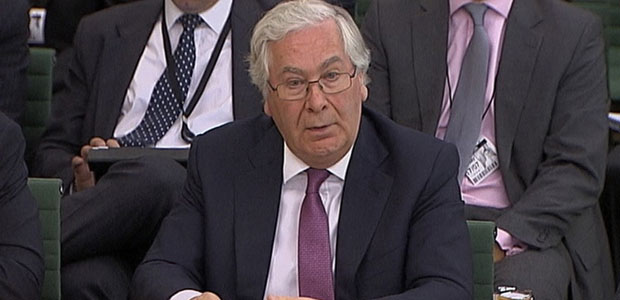Bank governor denies Libor pressure on Barclays
Sir Mervyn King rejects suggestions that pressure was put on banks to misreport their lending rates, but admits pushing for Bob Diamond’s resignation as Barclays chief executive.

Giving evidence to the Treasury select committee, Sir Mervyn said that he and other governors of central banks around the world had discussed how Libor, the inter-bank lending rate, could be pushed down.
However, he denied that the Bank of England had instructed Barclays to lower its Libor submissions. He said it was sensible to want Libor to be lower as it was a barometer of the health of the market.
On Monday, Jerry del Missier, the former chief operating officer at Barclays, said he had passed instructions to lower Libor submissions from Mr Diamond (pictured left) to the bank’s money markets desk. He said he did so believing it was the wish of the Bank of England following a conversation between Mr Diamond and deputy governor of the Bank of England Paul Tucker.
It seemed to me that the result that the chairman had resigned meant that the board had not fully understood the nature of the concerns and I thought it would be helpful to play a role in making sure they did understand. Sir Mervyn King
But Sir Mervyn told the committee that the bank had not expressed these wishes. “When a patient is sick you want to bring the temperature of the patient down,” he said. “There is a world of difference between thinking of ways to bring the temperature down and tampering with the thermometer.”
‘Sailing close to the wind’
Sir Mervyn and Lord Adair Turner, chairman of the Financial Services Authority, were also grilled by MPs on their role in Mr Diamond’s resignation from Barclays. Both admitted applying pressure to ensure his departure, not that of Barclays chairman Marcus Agius.
Sir Mervyn said: “It is possible to sail close to the wind once, you can sail close to the wind twice, maybe even three times, but when it gets to four or five times it becomes a regular pattern of behaviour, you do have to ask questions about the navigational skills of the captain on the bridge and that’s what Lord Turner and Andrew Bailey (executive director at the Bank of England) made very clear to the board.
“It seemed to me that the result that the chairman had resigned meant that the board had not fully understood the nature of the concerns and I thought it would be helpful to play a role in making sure they did understand.”
Lord Turner added: “If Bob Diamond had stayed on and given the extensiveness of the calls for his resignation from politicians and the press, I strongly suspect that would have been to the disadvantage of the shareholders.”
“Both of us (Mr Turner and Sir Mervyn) were giving a consistent message that they needed to think very clearly about whether Bob Diamond could have the confidence – not only of the market but of the external world – to make this substantial change. And that we were not certain that was the case.”
Sir Mervyn also said he had only known of wrongdoing at Barclays two weeks ago, emphasising that the Bank of England’s role is as a central bank, not a regulator.
“The first time we knew of alleged wrongdoing is when the reports came out two weeks ago,” he said. “We’d been through all our records and there was no evidence of wrongdoing or reporting the wrongdoing for the banks.”
-
Latest news
-
Government criticised for ‘watered down’ Renting Reform Bill8m

-
Former DUP leader in court over historic sex offence charges3m

-
Rapper sentenced to death in Iran after supporting Mahsa Amini protests, says lawyer4m

-
Russian deputy defence minister charged with ‘particularly large scale’ corruption3m

-
Sunak dismisses questions about defence spend increase4m

-




